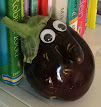Stanley Kubrick
One of the most arresting opening shots that I've ever seen. Eerie doll-like face of our young narrator and hero, as if not just from another time, but from another species alltogether, in that utterly blank unemotional look, with the pantomime eyelashes on the right eyelid.
So right from this 'Establishing' shot, (I use the term knowingly in the wrong sense, as it establishes not the physical setting of the film, but the person of the hero, his very soullessness), till the very end of the film, I did not feel an iota of empathy with the hero.
You might of course argue that the whole point of the thing is he's monster, and canot be sympathised with. Bollocks to that. Even if it is a serial killer psycho-sociopath, as long as he is the protagonist, the audience has to identify with him. The enduring beauty of an 'absurd' play like 'Waiting for Godot' is due to that every single person who watches/reads it identifies to some extent (large extent, i would insist) with the utterly unreliable disease ridden slightly insane tramps, Estragon and Vladimir. Because they are helpless?
Our hero is certainly not.
Our lad is so bloody hard to find resonance with. Not only is he extremely goodlooking and unhealthily young and robust, he is leader of his gang, loved by his parents, fucked by pretty girls he seems to pick up with ease, and utterly indestructible.
Agreed that its all smooth sailing and he is indestructible till the double cross, but what was disappointing to me, is that the director fails to show that the heor actually falls after the turning point. he still glides indestructibly through, and remains so even when the credits roll up. There is absolutely no transformation. There is no addition to the boy's personality. So many adventures, and nothing to show in the end.
Telling places: when his counsellor hits him hard on his groin, it did not elicit a phantom wince in me (girl or boy, we all sympathise with this one particular thing). And he recovers his composure in a minute!
His friends strike him on the face, leaving pnly a small nick on his nose to double cross him.
The police men, in the interrogation cell, only just give him a small nick on the already existing scratch on the nose (pooh), and he seems to glide above prison horrors untouched. He is a favourite of the priest, and the one guy who distrusts him, the bellowing officer, is helpless (though he runs the damn prison).
The only scene i came real close to feeling sympathy for the hero, was when he enters prison and is asked by the bellowing officer to turn in his personal stuff. the facade cracks just a teeny bit, till the smoothness slips on too soon.
I would think (Will Anthony Burgess who wrote the book agree with me?) that a most strident effort should've been made us identify with the hero who is a rapist and lives for 'ultra-violence' and Ludvig Van (Beethoven), show us his soft spots, show how his mind works, why he seems to adore violence, move us, so that we will inturn be horrified by the latent violence lurking within ourselves.
Is that difficult? I'm no expert on film-making, but as far as characterisation goes, if we could perceive small chinks in the man, show him fumble a bit here and a bit there, have him fail at picking a girl up, or show him really suffer at the hands of the counsellor or policemen (he does suffer when his friends turned poice in the latter half beat him up, but by then its too late, we simply do not identify wit hhim anymore), I don't know, show is parents to be hideous, show the root of his violent tendencies, show more of his passion for Beethoven, or more of his love for his snake... , in short, show him more of a human being with violent tendencies rather than an unruffled machine programmed for violence?
Oh, i seem to be stuck to the one aspect of the movie, but to me, that is the most important, the only important element in the exercise. We ought to be horrified at the violet tendecies brimming within ourselves.., isnt the boy the face of our heinous tendencies, our society bred callousness? So why do not we see ourselves in him?
It seems to be a sorta insolence that Stanley Kubrick said he didnt realise the final chapter of the book had the hero renounce violence, as it was cut out of the american edition, till he almost finished the screenplay. And that even after, he didnt consider filming it. WTF? Not even a consideration? (Needlessly Bitchy I know)
Having said so much (about one thing only, admittedly), I'm eager to read the book and compare it with film.
About Me

- Anita Sivakumaran
- I 'write a little everyday, without hope, without despair' as per Isak Dinesen. I like to get the writing done quickly so I can go out to grow veg and play tennis.
Tuesday, March 28, 2006
Subscribe to:
Post Comments (Atom)
4 comments:
Hey, this is freaky! I accidentally chanced upon this. How're you?
Hey, this is freaky! I accidentally chanced upon this. How're you?
Gangs! Great, how are you? LEt me see if i can find you on fb
Post a Comment